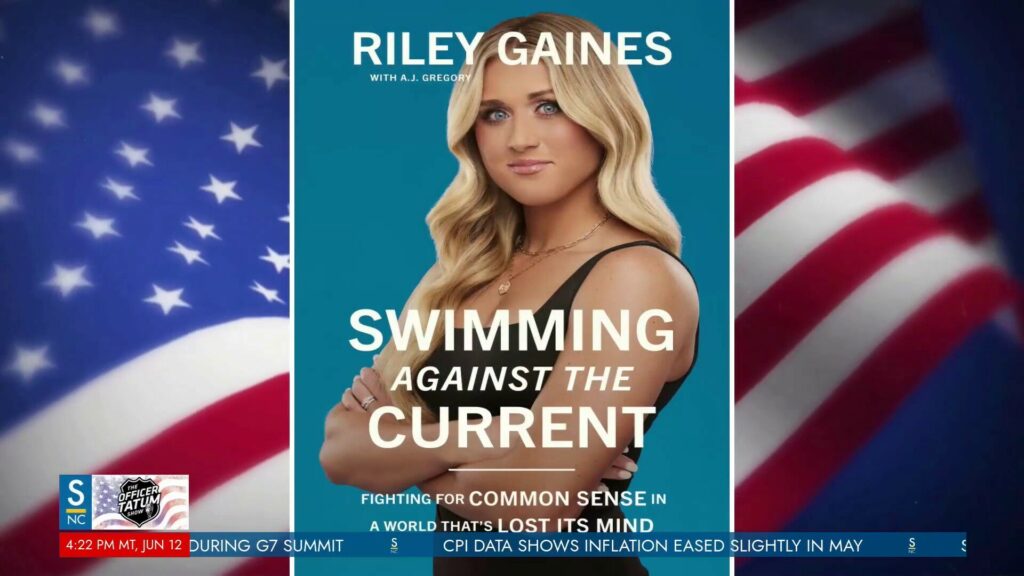Gender Ideology, LGBT+
How Riley Gaines became one of America’s most successful activists
The wildest thing about the new book by swimmer-turned-activist Riley Gaines is that it had to be written in the first place. Swimming Against the Current: Fighting for Common Sense in a World That’s Lost its Mind (Center Street, 2024) is part memoir, part manifesto, written by a young woman famous not primarily for her impressive career—12-time All-American swimmer, two-time Olympic Trial Qualifier, five-time SEC Champion—but because she was forced to compete against a man. That experience turned her into an activist, and her account is a fascinating glimpse at the collision between college sports and transgender activism.
Gaines cites two key radicalizing events in her life (she is 24 and thus not old enough to remember 9/11). The first came on March 18, 2022. Gaines was swimming for the University of Kentucky in the 200-yard National Collegiate Athletics Association (NCAA) freestyle championship. She tied for fifth place against Lia Thomas, a mediocre male swimmer who had recently begun to identify as female and promptly break records and clean house at swim meets across the country. Just before the event, Gaines and the other girls had been stunned when, without any warning from coaches or anyone else, Thomas strode into their changing room and began to undress. Gaines describes the scene:
I was getting dressed back into my clothes from my practice suit when it was like someone unplugged the sound. Dead silence. My back was turned toward the door, but before I even turned around, I knew what the silence meant … Upon turning around and shifting my eyes to the 6’4” Thomas, I immediately felt the inherent need to cover my chest, as someone with a male gaze and a male voice entered the room. Some of the girls grabbed towels, or shirts, or whatever was close by and covered the exposed parts of their body. Other girls looked the other way. We were all in various stages of nakedness. None of us said a word. I can’t accurately put into words the feelings of violation when hearing a man’s voice in the locker room when you are fully nude. Thomas walked toward the corner of the locker room and began to change out of a woman’s practice suit and get naked. Right in front of us. No introduction, no ‘Excuse me,’ no explanation, no privacy for us.
Scenes like that are playing out in changing rooms wherever the transgender movement has gained ground. Locker rooms, it seems, are always the first territory they wish to take. Gaines writes that Kylee Alones of North Carolina State University, a 31-time All-American swimmer, was so uncomfortable with being forced to undress in front of Thomas that she took to changing in a storage closet. It is truly bizarre to consider: the most decorated swimmer of all time said she was “grateful” to have a closet in which to change, because NCAA officials rejected girls’ requests for privacy. Natural modesty, once a prized virtue, is forbidden in Trans America.
Gaines observes that we are enduring the fourth wave of feminism, “the wave where men make the best women.” Indeed, Lia Thomas—a male with a functioning penis—was the star of a TV special for Women’s History Month on ESPN. ESPN did not mention Thomas’s physical advantages (many of his swim times were comparatively ridiculous) and profiled no actual women. When Gaines and Thomas tied for fifth place, an NCAA official told Gaines that Thomas would get the trophy. When she asked why, he told her—with a defeated look—that he had been informed that Thomas had to be holding the trophy when the press photos were taken.
Gaines was not the only girl to speak out—she writes that many others did, as well. Most did so anonymously for fear of backlash. Gaines does an excellent job describing the world of competitive swimming and the years of gruelling work it takes to compete at a college level, and the crushing disappointment felt by girls who lost their positions and prizes to males against whom they were forced to compete. The female swimmers were frequently warned by university officials ahead of competitions: “Shut up and swim. Use the ‘preferred pronouns.’ Don’t talk to the press. Say the right lines.”
READ THE REST OF THIS COLUMN AT THE EUROPEAN CONSERVATIVE








